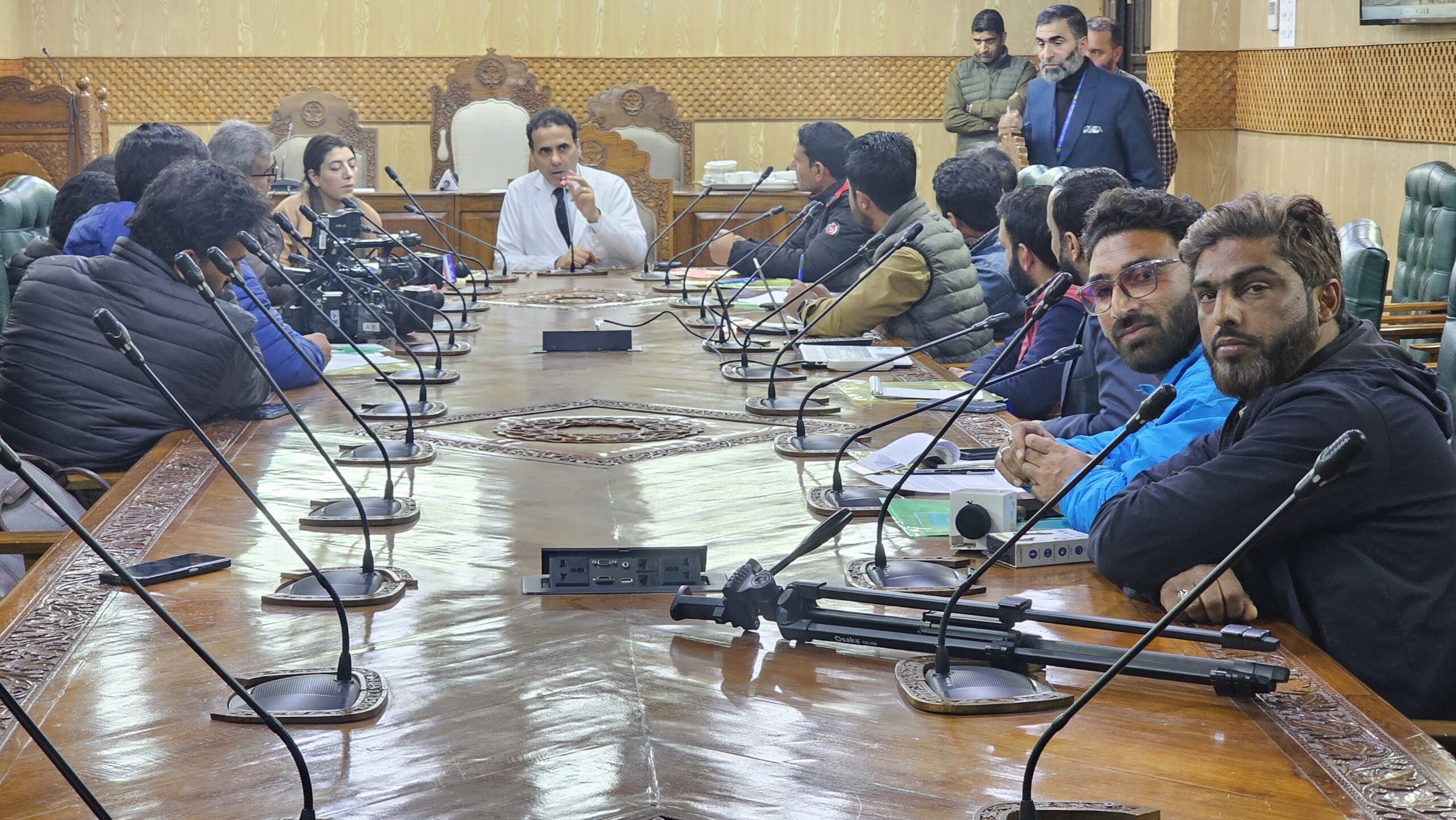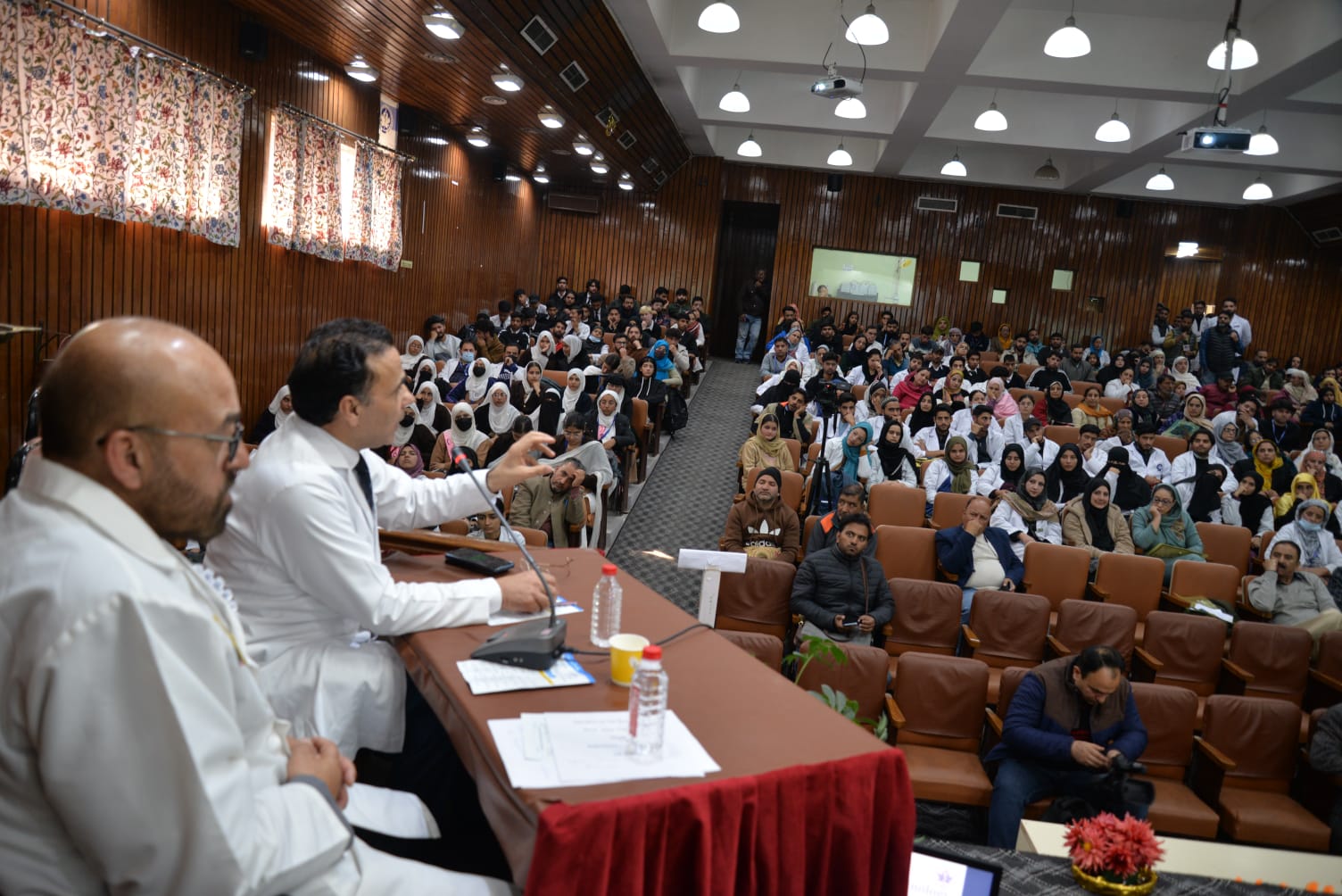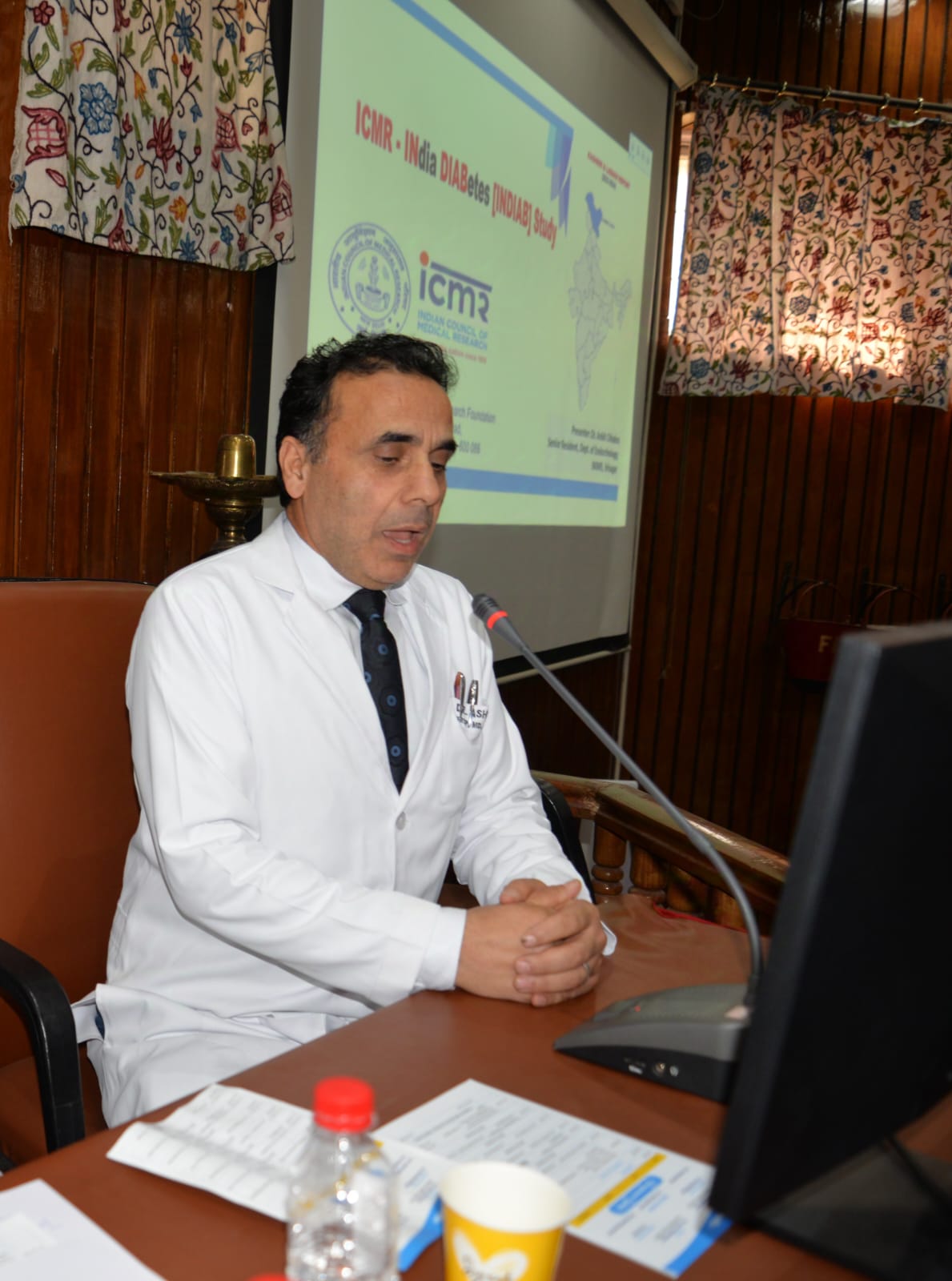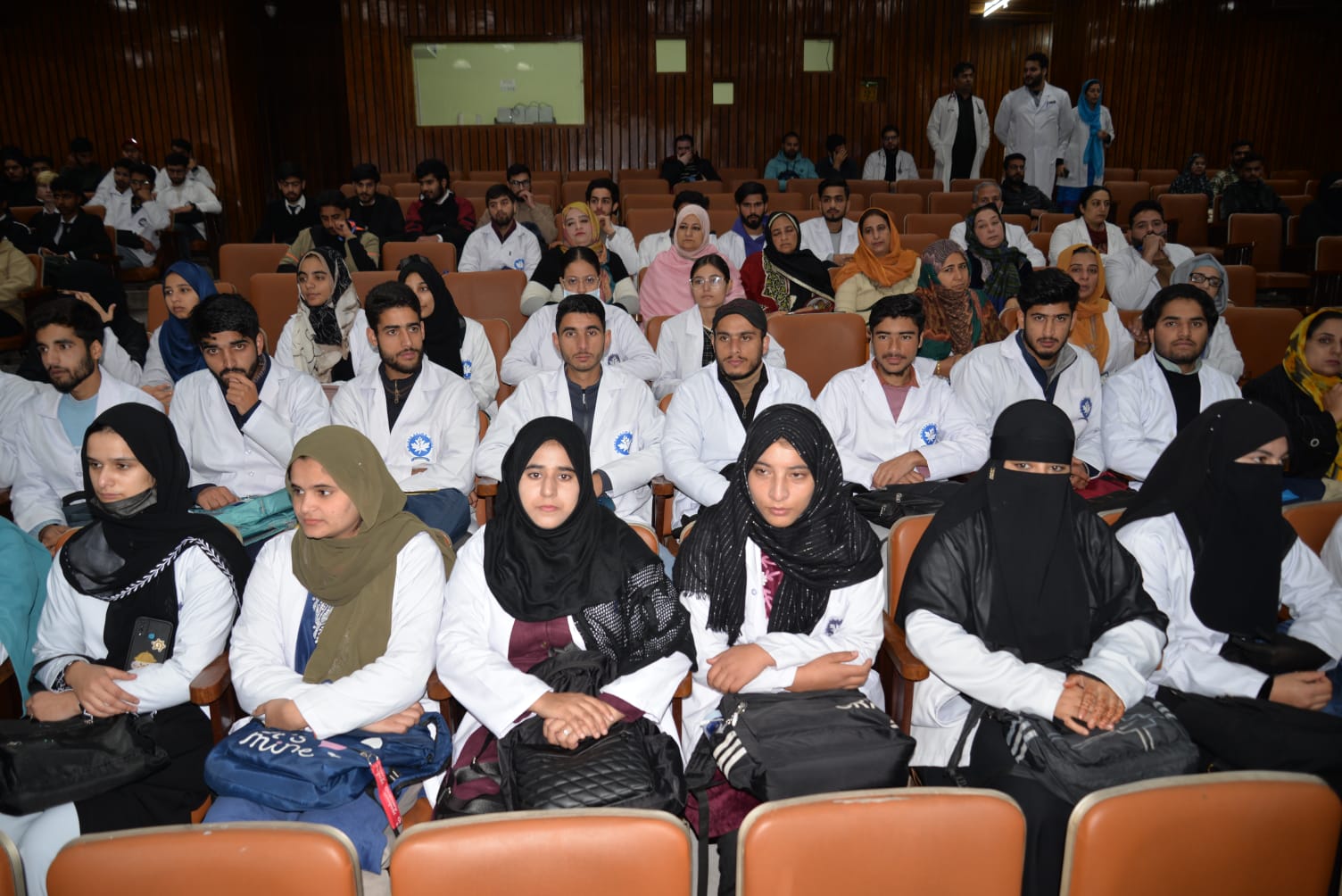Srinagar: On world diabetes day, the department of Endocrinology SKIMS today organised a day long event at SKIMS Auditorium where the outcomes/ results of the world’s largest ICMR INDIAB Study of Jammu Kashmir & Ladakh on communicable disease (NCD) was presented . The study was presented by Dr. Ankit Chabbra , DM Endocrinology and the session was chaired by Director SKIMS/ EOSG & Principal Investigator of the study Prof. Mohd. Ashraf Ganie & Dean Medical Faculty SKIMS Prof. Shariq Masoodi. Director SKIMS / EOSG Prof. Ashraf Ganie had a detailed interaction with media about the study outcomes.
The study was presented by Dr. Ankit Chabbra , DM Endocrinology and the session was chaired by Director SKIMS/ EOSG & Principal Investigator of the study Prof. Mohd. Ashraf Ganie & Dean Medical Faculty SKIMS Prof. Shariq Masoodi. Director SKIMS / EOSG Prof. Ashraf Ganie had a detailed interaction with media about the study outcomes. Prof. Ashraf stressed that the pandemic of Noncommunicable diseases is preventable through healthy life style choices. He said health care setups, administration, govt. and social organizations need to work collectively and need to work on social & cultural practices and there is an urgent need to make people aware about the serious repercussions of these diseases which are mainly due to unhealthy lifestyle practices.
Prof. Ashraf stressed that the pandemic of Noncommunicable diseases is preventable through healthy life style choices. He said health care setups, administration, govt. and social organizations need to work collectively and need to work on social & cultural practices and there is an urgent need to make people aware about the serious repercussions of these diseases which are mainly due to unhealthy lifestyle practices.  He urged the media to play a constructive role in creating wide awareness among the general masses. The study showed that non- communicable disease ( NCD) rates are rapidly increasing in India with wide regional variations. The study aimed to quantify the prevalence of metabolic NCDs in India and analyze interstate and inter-regional variationsThe Indian Council of Medical Research–India Diabetes (ICMR-INDIAB) study, a cross-sectional population-based survey, assessed a representative sample of individuals aged 20 years and older drawn from urban and rural areas of 31 states, union territories, and the National Capital Territory of India. The study was conducted in multiple phases with a stratified multistage sampling design, using three-level stratification based on geography, population size, and socioeconomic status of each state. Diabetes and prediabetes were diagnosed using the WHO criteria, hypertension using the Eighth Joint National Committee guidelines, obesity (generalised and abdominal) using the WHO Asia Pacific guidelines, and dyslipidaemia using the National Cholesterol Education Program—Adult Treatment Panel III guidelines.The Kashmir & Ladakh Report (July, 2023- January, 2024) of ICMR INDIAB study conducted under the leadership of Prof. M. Ashraf Ganie, reports on the prevalence of diabetes, prediabetes, obesity, hypertension and dyslipidemia in a representative sample of adults in both urban and rural areas of union territory, and attempts to identify region-wise and state-wise differences in the status of these NCDs in the country using robust sampling and diagnostic methods and therefore helps in assessing the present status of the epidemic of NCDs and their likely future trajectory.
He urged the media to play a constructive role in creating wide awareness among the general masses. The study showed that non- communicable disease ( NCD) rates are rapidly increasing in India with wide regional variations. The study aimed to quantify the prevalence of metabolic NCDs in India and analyze interstate and inter-regional variationsThe Indian Council of Medical Research–India Diabetes (ICMR-INDIAB) study, a cross-sectional population-based survey, assessed a representative sample of individuals aged 20 years and older drawn from urban and rural areas of 31 states, union territories, and the National Capital Territory of India. The study was conducted in multiple phases with a stratified multistage sampling design, using three-level stratification based on geography, population size, and socioeconomic status of each state. Diabetes and prediabetes were diagnosed using the WHO criteria, hypertension using the Eighth Joint National Committee guidelines, obesity (generalised and abdominal) using the WHO Asia Pacific guidelines, and dyslipidaemia using the National Cholesterol Education Program—Adult Treatment Panel III guidelines.The Kashmir & Ladakh Report (July, 2023- January, 2024) of ICMR INDIAB study conducted under the leadership of Prof. M. Ashraf Ganie, reports on the prevalence of diabetes, prediabetes, obesity, hypertension and dyslipidemia in a representative sample of adults in both urban and rural areas of union territory, and attempts to identify region-wise and state-wise differences in the status of these NCDs in the country using robust sampling and diagnostic methods and therefore helps in assessing the present status of the epidemic of NCDs and their likely future trajectory.
Kashmir & Ladakh prevalence-
• Known Diabetes- 5.4%
• New Diabetes- 2.4%
• Total Diabetes- 7.8%
• Prediabetes- 10.5%
• Hypertension- 30%
• Obesity- 57.6%
The findings from the ICMR-INDIAB study are expected to have far-reaching implications for public health policies and initiatives in India. State governments, which bear primary responsibility for healthcare delivery, will benefit from the study’s granular data in planning region-specific programs to prevent and manage NCDs. The comprehensive dataset from ICMR-INDIAB will help policymakers allocate resources more effectively, focusing on preventive healthcare, early diagnosis, and management of NCDs.In future discourse ICMR plans to use insights from the ICMR-INDIAB study to foster collaboration with local governments, healthcare providers, and community leaders. This multi-level collaboration aims to implement targeted interventions, promote healthy lifestyle modifications, and improve access to diagnostic and treatment services, particularly in underserved areas.
The comprehensive dataset from ICMR-INDIAB will help policymakers allocate resources more effectively, focusing on preventive healthcare, early diagnosis, and management of NCDs.In future discourse ICMR plans to use insights from the ICMR-INDIAB study to foster collaboration with local governments, healthcare providers, and community leaders. This multi-level collaboration aims to implement targeted interventions, promote healthy lifestyle modifications, and improve access to diagnostic and treatment services, particularly in underserved areas.


Comments are closed.